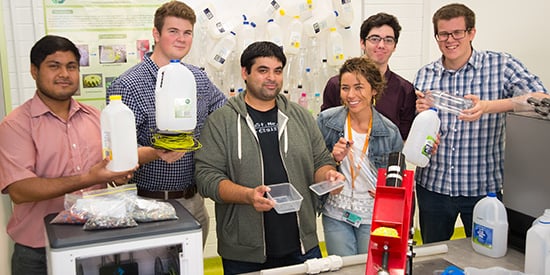Solar-powered 3D printers turn plastic trash into clean water
Media releaseSolar powered 3D printers may soon solve the developing world problems of ubiquitous plastic rubbish and lack of access to clean water supply.
Deakin University is currently working on the world-first technology capable of printing plumbing and sanitation supplies using discarded plastics, to be trialled in the Solomon Islands by children's charity Plan International Australia later this year.
Dr Mazher Mohammed, research fellow at Deakin's School of Engineering, heads up the team developing the 3D printer prototype.
"This kind of 3D technology can be used to rapidly replace broken plastic seals, pipes and other devices essential for water supply or sanitation. This is critical as many disaster zones and developing areas do not have reliable access to power," Dr Mohammed said.
"The important part of this project is its sustainability. Not only will the printer be able to use plastic rubbish found nearby, but it will also run off a solar powered battery."
Dr Mohammed has already produced 3D printing filaments from different types of plastic rubbish, including milk bottles from the office kitchen, to print basic plumbing parts.
The printers will be trialled at Plan International Australia's projects in the Solomon Islands later this year. Plan Australia's Manager for Water, Sanitation and Hygiene, Tom Rankin, says the potential applications of the technology - powered by free and abundant sunshine - are 'limitless'.
"This technology really lends itself to developing countries, where plastic waste has exceeded the capacity of governments to manage it," Mr Rankin said.
"In the streets of Honiara, there is plastic literally everywhere. It clogs up the drains and flows out into the sea, killing marine life. Our aim is to turn this plastic into useful parts.
"If we can prove the concept and get the technology working well, it can be used across a raft of different fields, not just water and sanitation. Really, you’re only limited by your imagination about what you can print. The potential for this is amazing."
Deakin University is using crowdfunding to help meet the costs of the printers' first prototypes. So far, almost $18,000 has been raised towards the $30,000 target, with support from the English Family Foundation. Plan International Australia has also contributed $10,000 to the project, with additional financial support from Deakin's Centre for Humanitarian Leadership and School of Engineering.
Watch and share Deakin's crowdfunding video: https://startsomegood.com/3d-wash-3d-printing-for-health-and-enterprise

